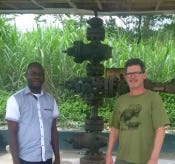Joe Costello on Energy and Democracy
“The greatest organizing force of the Industrial era was fossil fuels. The mass scale burning of fossil fuels resulted in an unprecedented global reorganization of nature, human society, and culture.”
I’m working on the introduction to The Soviet Jew, which I hope I’ll be sending out in the next week or so. In the meantime, I’d like to reprint an essay my friend Joe Costello just wrote about the grip that technologies — and especially technologies that require immense amount of energy to operate, which is basically all the technologies we use right now — have on our society. It’s a great essay, and I pretty much agree with all of it.
It’s obvious that we have figure out new ways of living that don’t totally depend on the death-drive, hyper-industrial technologies that surround us today. It’s also obvious that in order to do that we’ll have to return, at least in some aspects, to slower, more local, pre-industrial modes of living. But I’m not so sure we’re capable of making this kind of transition, without being forced to by some kind of massive collapse or calamity that will be outside of our control. Our politics, our culture — everything’s too locked in to the present way of doing things. In fact, the rest of the world’s ferociously trying to catch up with the high-energy lifestyle pioneered by America and put in place by cheap fossil fuel energy. So if anything, all trends are headed the other way: to more energy production, more consumption, more digging, more stuff, more trash, more pollution. The system is totally entrenched. Hell, it’s still considered cool and radical for the popular left here in the imperial core to push for more nuke energy. People simply cannot imagine living in a society organized around different energy values. And I sympathize. It’s hard for me to imagine it, too.
—Yasha Levine
PS: I’ve published a couple of other things by Joe. You can read them here, here, and here. Joe isn’t on social media but you can email him at joecostello@gmail.com.
Energy and Democracy
By Joe Costello

Power is organization. All politics is about power, thus about organization. Yet understanding organization, in concept, structure, and process, is mostly missing from American politics today. Largely never understood, the greatest organizing force of the Industrial era was fossil fuels. The mass scale burning of fossil fuels resulted in an unprecedented global reorganization of nature, human society, and culture. In understanding energy's role in organizing human affairs, a recent book titled Energy and Civilization A History, by Vaclav Smil, is seminal, essential, and excellent. I would place Smil's work aside Braudel's Civilization and Capitalism, as ingenioushistory that helps us understand the past and present, offering much needed guidance for a necessary reshaping of the future.
Smil succinctly sums up his history with this paragraph,
“The adoption and diffusion of new energy sources have been the fundamental physical reasons for economic, social, and environmental change and they have transformed virtually every facet of modern societies: the process has always been with us, but its pace has been accelerating. Prehistoric changes brought about by better tools, the mastery of fire, and better hunting strategies were very slow, unfolding over tens of thousands of years. The subsequent adoption and intensification of permanent farming lasted for millennia. Its most important consequence was a large increase in population densities, leading to social stratification, occupational specialization, and incipient urbanization. High-energy societies created by the rising consumption of fossil fuels became the very epitomes of change, leading to a widespread obsession with the need for constant innovation.”
Smil brilliantly concludes,
“But one fundamental reality had not changed: all of these clear and impressive historical trends tracing the rise of new sources, new superior performances, and efficiency gains do not mean humanity has been using energy in a progressively more rational manner. … Indeed, higher energy use by itself does not guarantee anything except greater environmental burdens. The historical evidence is clear. Higher energy will not ensure a reliable food supply; it will not confer strategic security; it will not safely underpin political stability; it will not necessarily lead to a more enlightened governance; and it will not bring widely shared increases in a nation's standard of living.”
Read the above paragraph again. Understand this is a completely opposite conclusion from our established and dominant industrial thinking and values. However, they are essential insights for a world struggling with a toxic legacy of past energy use and the pressing need to completely redesign global energy use for the future.
The global political legacy of fossil fuels' reorganization of society is a largely unimpeded trajectory of inequity. Smil writes, “By 2015 the richest 10% of humanity (living in 25 nations) claimed about 35% of the world's energy. In personal terms, this meant that a week's worth of per capita energy use in the United States is equivalent to the total annual primary energy consumption of an average Nigerian and two years of the annual energy supply for an average Ugandan.”
No view more strikingly exposes the global inequity of energy use and the anti-democratic organization necessary to bring it about than looking at the United States' and Nigeria's oil relationship. Right before Nigeria's 1960 independence from the British, oil was discovered in the Niger delta. Over the past six decades, instead of being used to develop Nigeria, and make no mistake, Nigeria could have burned every barrel, the vast majority of oil was exported, plenty to the United States. For years, gasoline in every American car tank has contained some oil originating from Nigeria.
For four decades, the money gained from export was used to underwrite a violent and brutal rule by the Nigerian military, who in 1978, murdered Funmilayo Ransome-Kuti at the age of 77 by throwing her out the second floor window of her son Fela's house. The environmental, political, economic, and cultural damage done by the oil industry devastated the people and environment of the Niger delta. In 1990, the Ogoni people of the Niger delta rose to assert democratic control of the oil produced on their lands, and thus democratic control of their lives. Led by Kenule Beeson Saro-Wiwa, the Ogoni released a Bill of Rights.
“Ken” Saro-Wiwa was a very popular writer and television producer known across Nigeria. A beautiful and powerful voice for democracy, he advocated for the rights of his Ogoni people. In 1995, Nigeria's military junta, with the complicity of Shell Oil, arrested Saro-Wiwa and eight others. A mock trail was staged, after all were hung. At the exact moment Ken Saro-Wiwa gasped his last breath dangling from the end of a despotic junta's rope, tens of thousands Americans of every race, creed, gender, and income were literally at the other end of that rope filling their tanks with Nigerian oil.
Oil completely reorganized America and Nigeria politically and economically, creating immensely powerful and undemocratic entities such as Shell and Nigeria's military junta. In the parlance of economics, the 20th century's dominant value system, Saro-Wiwa's and his compatriots' deaths would simply be written off as an “externality,” a cost not needed to be accounted, so too the destruction done to Ogoniland.
The political economic value system developed in the Industrial era has been a poor measure of the real costs of energy. As Smil writes, “To talk about energy and economy is a tautology: every economic activity is fundamentally nothing but a conversion of one kind of energy to another, and monies are just a convenient and often unrepresentative proxy for valuing the energy flows.”
Today, it is obvious to more people, though not nearly enough, that new value systems must arise for a proper accounting of the true value and costs of energy, certainly this is no small task. To do so requires overthrowing the entrenched ideas, systems, and powers of “those who believe that endless technical advances can satisfy steadily growing energy demand.” Smil points to a piece by Ivan Illich, Energy and Equity, which sort of brilliantly does exactly that.
I've spent a number of years talking about the need for analysis using an understanding of the politics of technology. Illich's piece, written fifty years ago, does exactly this. He refutes industrialism's greatest tenets writing, “Beyond a certain point, more energy means less equity,” and, “Over industrialization enslaves people to the tools they worship, fattens professional hierarchs on bits and on watts, and invites the translation of unequal power into huge income differentials. It imposes the same net transfers of power on the productive relations of every society, no matter what creed the managers profess, no matter what rain-dance, what penitential ritual they conduct.” Amen.
These are keen insights and necessary critiques utilizing analysis derived from a politics of technology. ALL adopted technologies create their own environments, bestow their own values, and institute power structures. As an example, using a spot-on insight of American car culture, Illich writes,
“This profound control of the transportation industry over natural mobility constitutes a monopoly much more pervasive than either the commercial monopoly Ford might win over the automobile market, or the political monopoly car manufacturers might wield against the development of trains and buses. Because of its hidden, entrenched, and structuring nature, I call this a radical monopoly. Any industry exercises this kind of deep-seated monopoly when it becomes the dominant means of satisfying needs that formerly occasioned a personal response. Traffic serves here as the paradigm of a general economic law: Any industrial product that comes in per capita quanta beyond a given intensity exercises a radical monopoly over the satisfaction of a need.”
Illich precisely reveals how the present talk of monopoly and anti-trust, which after decades disappearance has shown a weak reappearance in our broken politics, doesn't even reach the level of inadequate. American anti-trust politics never had a great understanding of the power challenges created by industrial technology, thus over time, it was largely hopeless in results.
In one excellent point on the politics of energy and technology, Illich notes the inequity of a high-energy transportation system, where speed itself is unequally accessible political power. Those with the greatest power wield the greatest speed. A simple example today is access to private jets. Barron's writes there's, “22,000 business jets flying around the world," speed is power.
Illich concludes the most human designed social transit systems, thus the most democratic would center on walking and the bicycle. He writes, “Participatory democracy demands low-energy technology, and free people must travel the road to productive social relations at the speed of a bicycle.”
Agreeing or not with Illich's conclusion isn't the point, though he's much more right than wrong. More important is an understanding of energy use as a political process. All utilized energy organizes society. The resulting organization, in part, defines political structures, whether they're democratic or tyrannical. Any society wanting democracy needs to create democratic energy systems. Today's centuries old Agrarian era structures of government and the Industrial era mega-corporations straddling atop them are simply incapable of creating the necessary processes, values, and organization of a new energy era. We have no democratic politics today. If democracy is to arise anew it needs new organization, democratic organization that understands energy use and technology.
“We mutually pledge to each other our Lives, our Fortunes, and our Sacred Honor.” - July 4th, 1776.





Thanks, Yasha. Please tell Joe that he needs to get his own Substack; I'd subscribe in a heartbeat.